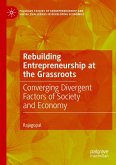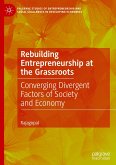This book focuses on reflexivity as applied to entrepreneurship in the countries of the Global South. Specifically, reflexivity represents a sociological notion designed to explain the structures of human beliefs; however, its usefulness in business and entrepreneurial frameworks is the gap that must be filled.
The text considers the fact that entrepreneurs in the Global South benefit from distinctive and diverse institutional peculiarities, in contrast to the nations of the Northern Hemisphere. Strongly influenced by historical, political, cultural, and economic factors, these factors have historical roots manifested in the role of government, the collaboration between companies and universities, the development of cultural heritage, and ethical values.
In providing an overview of entrepreneurship that is divergent from the traditional Western approaches, this work offers new, more holistic perspectives that consider subjective, contextual, and social factorsto understand the complexity inherent to entrepreneurship to analyze the realities of the Global South, therefore expanding the knowledge and opportunities that lie ahead. It will generate debate among researchers about how reflexivity can be effectively incorporated into the region s entrepreneurial endeavors and public policies to optimize its social and economic contributions.
The text considers the fact that entrepreneurs in the Global South benefit from distinctive and diverse institutional peculiarities, in contrast to the nations of the Northern Hemisphere. Strongly influenced by historical, political, cultural, and economic factors, these factors have historical roots manifested in the role of government, the collaboration between companies and universities, the development of cultural heritage, and ethical values.
In providing an overview of entrepreneurship that is divergent from the traditional Western approaches, this work offers new, more holistic perspectives that consider subjective, contextual, and social factorsto understand the complexity inherent to entrepreneurship to analyze the realities of the Global South, therefore expanding the knowledge and opportunities that lie ahead. It will generate debate among researchers about how reflexivity can be effectively incorporated into the region s entrepreneurial endeavors and public policies to optimize its social and economic contributions.








